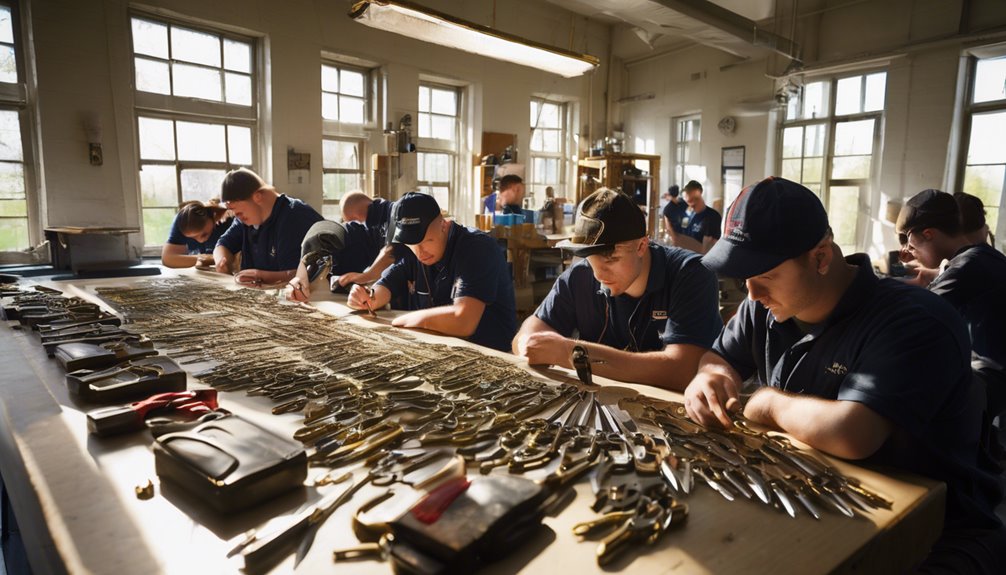Becoming a locksmith in Ohio might seem like a magical gateway to endless opportunities. With the right steps, you can access a rewarding career that many overlook. It all starts with a solid foundation of education and training. But what comes next? Understanding the nuances of certification and practical experience is essential for your success. Let’s explore how you can turn this ambition into reality.
If you’ve always dreamt of a career that’s a lock for stability and intrigue, becoming a locksmith in Ohio might just be your key to success.
Key Takeaways
- Obtain a high school diploma or GED to meet the minimum educational requirement for aspiring locksmiths in Ohio.
- Enroll in a locksmith training program lasting 3 to 6 months to acquire essential skills and knowledge.
- Gain practical experience through apprenticeships, working with experienced locksmiths for 6 months to 2 years.
- Consider obtaining locksmith certification, such as the Certified Professional Locksmith (CPL), to enhance your credibility in the industry.
- Start your locksmith business or seek employment with local companies, ensuring compliance with licensing requirements.
Steps to Become a Locksmith in Ohio

Becoming a locksmith in Ohio involves a few straightforward steps. First, you’ll need a high school diploma or GED, as it’s the foundation for your journey.
Enroll in a locksmith training program lasting 3 to 6 months to gain essential skills in locks and security, including installation, repair, and key duplication.
After that, seek practical experience through apprenticeships or by working with seasoned locksmiths, which may take an additional 6 months to 2 years.
Although Ohio doesn’t require a state license, pursuing locksmith certification, like the Certified Professional Locksmith, can boost your credibility.
Finally, look for employment with local locksmith companies or consider starting your own locksmith business to put your skills to use in the field.
Eligibility Requirements for Aspiring Locksmiths
If you’re considering a career as a locksmith in Ohio, you’ll need to meet a few key eligibility requirements.
First, you must be at least 18 years old and pass a criminal background check, ensuring you have a clean record.
While no formal education is required for the locksmith profession, acquiring practical experience is essential. You can gain this through an apprenticeship with experienced locksmiths or by enrolling in locksmith training programs at trade schools.
Additionally, you’ll need a state-issued business license or a local City Hall license to operate legally.
Finally, embracing continuous learning and keeping up with the latest security technologies will help you succeed and grow in this dynamic field.
Training Programs for Locksmiths

After meeting the eligibility requirements, the next step in your journey to becoming a locksmith in Ohio involves selecting the right training program. You can find locksmith schools at local trade schools, community colleges, or online institutions, typically offering programs that last 3 to 6 months.
Look for ALOA-approved programs to guarantee quality training.
Here are some key aspects to take into account:
- Certificate options that cover essential locksmithing skills
- Courses in key cutting, lock installation, and security systems
- Practical experience through hands-on training
- Apprenticeships for working alongside experienced locksmiths
Choosing the right program sets you up for success in this rewarding field!
Certification and Licensing Information
Certification is an essential step for locksmiths in Ohio, even though the state doesn’t require a formal license to practice.
To stand out in the locksmith industry, you should consider obtaining certifications from reputable organizations like the Associated Locksmiths of America (ALOA). One of the most recognized credentials is the Certified Professional Locksmith (CPL), which showcases your ability to design, install, maintain, and repair lock systems.
While you won’t need to meet traditional licensing requirements, passing an exam to validate your skills is vital. Additionally, enrolling in a training course can enhance your knowledge.
Remember to stay updated on industry regulations and continue your education, ensuring you remain compliant and avoid any potential penalties while working as a certified locksmith.
Building Your Locksmith Business

Building a successful locksmith business in Ohio requires a strategic approach that combines effective marketing, compliance, and continuous education.
Establishing a strong online presence through a professional website and SEO is essential for attracting customers. You’ll also want to enhance your marketing efforts with targeted online advertising like Google ads.
Consider these key strategies:
- Verify compliance with local licensing requirements for legal operation.
- Network with industry professionals and join trade associations for mentorship.
- Continuously educate yourself on new security technologies to stay competitive.
- Stay attuned to customer demands by regularly evaluating market trends.
Continuous Learning and Career Development
To thrive as a locksmith in Ohio, you need to prioritize ongoing education and stay updated on the latest security technologies.
Attending industry seminars and connecting with other professionals can open doors to valuable networking opportunities.
Ongoing Education Importance
Continuous learning is essential for locksmiths in Ohio, as it guarantees you stay abreast of advancements in security technology and evolving client needs. Ongoing education through locksmith schools and training programs helps you refine your skills and knowledge.
Attending industry seminars not only expands your expertise but also keeps you competitive. Here are some key benefits of ongoing education:
- Gain insights into new products and installation techniques
- Improve your credibility with certification programs
- Stay updated on the latest training requirements
- Enhance networking opportunities through trade associations
Industry Networking Opportunities
How can you elevate your locksmith career while enhancing your skills? By actively engaging in industry networking opportunities.
Attending industry seminars hosted by the Associated Locksmiths of America (ALOA) offers valuable insights into the latest security technologies and connects you with seasoned professionals.
Joining local locksmith associations not only fosters relationships with peers but also facilitates access to resources for continuous education.
Participating in training programs from lock manufacturers keeps you updated on new products and installation techniques.
Don’t underestimate the power of online forums and social media groups for collaboration.
Continuous education through workshops can lead to advanced certifications, which locksmiths must pursue for credibility and expanded career opportunities, ultimately driving your professional growth.
Frequently Asked Questions
Is It Worth Training to Be a Locksmith?
Absolutely, it’s worth training to be a locksmith.
You’ll gain valuable skills in key cutting, lock installation, and security systems, making you a sought-after professional.
With an average salary around $44,490, and even higher in certain areas, it’s a financially rewarding career.
Plus, the job offers stability and fulfillment for those passionate about security.
How Long Does It Take to Learn to Be a Locksmith?
Becoming a locksmith can feel like opening a treasure chest of skills!
Typically, it takes you about 3 to 6 months to complete a training program. After that, you’ll immerse yourself in an apprenticeship that can last from 6 months to 2 years, giving you hands-on experience.
Do Locksmiths Make Good Money?
Locksmiths can make good money, depending on various factors.
On average, you might earn around $44,490 per year, but in cities like Columbus, that jumps to about $53,140.
If you have advanced certifications or specializations, your earning potential increases even more.
While employment opportunities may shift slightly, the ongoing demand for security services means you can enjoy job stability and the chance for income growth as you gain experience.
Do You Need a Certification to Be a Locksmith?
Isn’t it intriguing how a key can open not just doors, but also opportunities?
While you don’t need a certification to work as a locksmith, gaining one can set you apart in this competitive field. Certifications like the Certified Professional Locksmith (CPL) enhance your credibility and marketability, making you more attractive to employers and clients.
Plus, they often lead to better job prospects and professional growth, so investing in your skills is worth considering.








